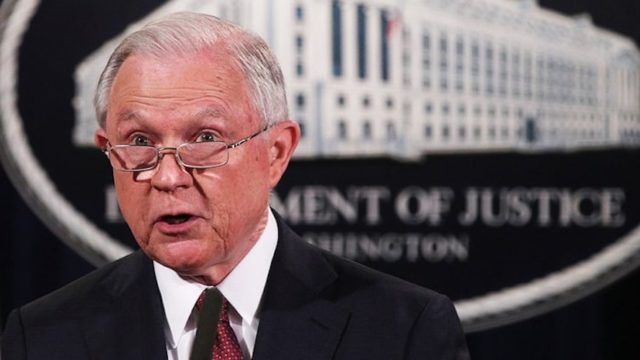“Na’arishkeit” is Yiddish for foolishness, especially that of callow youth. It well describes the tantrum thrown early in January by enthusiasts of state legalization of recreational and medicinal marijuana sales. Throwers included Sen. Cory Gardner, Colorado Republican, the American Civil Liberties Union, and others afflicted by Attorney General Jeff Sessions’ notice to federal prosecutors that they — gasp! — consider enforcing the U.S Controlled Substance Act, under which pot commerce is illegal.
Where federal law supervenes, state statutes — like those of Colorado and a number of other states, plus the entity known as the District of Columbia — cannot go. A civil war was fought once to settle the matter over another issue some states felt rather strongly about.
To review: In 1830, Sen. Robert Hayne of South Carolina and Sen. Daniel Webster of Massachusetts, staged their famous debate over states’ rights versus national authority, Hayne defending the theory of nullification. Tariff disagreements were the immediate issue, but at bottom the South hoped to establish nullification to protect slavery in individual states from restriction by congressional Northerners.
President Andrew Jackson asserted that nullification amounted to treason, and Congress backed him with the 1833 “Force Bill,” affirming the president’s authority to use the Army to ensure state obedience to federal law. One of Kentucky Sen. Henry Clay’s artful compromises managed to dodge the crisis. Secession would wait another generation.
But since Lee surrendered to Grant in 1865, nullification has been a very dead letter in U.S. legal theory. However, in 2013 the Obama administration advised federal prosecutors to downgrade if not ignore enforcement of marijuana laws, ostensibly in favor of other crime-fighting priorities.
At that point, the campaign by combined detachments of baby boomers, slackers, civil libertarians and hopeful weed industry investors to normalize pot use intensified. This regardless of U.S. statutes the would-be pot nullifiers lacked the votes in Congress to amend or repeal.
Ironically, the marijuana legalization effort spread just as the country was in the final throes of its decades-long public health push to tax and stigmatize tobacco use into near extinction. Even Gov. Jerry Brown, California Democrat, once lampooned as “Governor Moonbeam,” wondered aloud about America the stoned competing economically with China and Japan.
Comes now Attorney General Sessions saying, matter-of-factly, that the law is the law and government officials have sworn an oath to uphold it. Suddenly, poses of righteous indignation are struck throughout the Union.
On the subject of the Union, Webster notably climaxed his two-day reply to Hayne with the cry of “Liberty and Union, now and forever, one and inseparable!” If that is still the case, then Colorado never legalized marijuana sales because it lacked authority to permit them in the first place.
But maybe Mr. Sessions is mistaken and nullification has made a comeback. One Deborah Harrison, customer in a Los Angeles pot shop, reportedly declared, “This is California, and we are going to do what we do here. [Sessions] can push it if he wants to, and we can secede from the Union.”
And in other states, if not over the putative right to get high by any means convenient, then perhaps school segregation? Establishment of religion?
When rule of law is sacrificed to clamorous infatuation, ugliness issues from Pandora’s box of political expedience. One could imagine a situation in which states and municipalities chose to ignore lawful federal authority on immigration matters and declare themselves “sanctuaries.”
They might refuse to cooperate with U.S. Customs and Border Protection or Immigration Control Enforcement officials. Instead of being detained and possibly deported, people in this country illegally, whether criminals, terrorists or those who simply jumped the line ahead of legal immigrants might be allowed to remain.
You say that’s already the situation?
Next, you’ll claim there’s a federal department of education, usurping local and state primacy in this area of constitutional federalism, and — during the administration immediately past — warning schools to let boys use girls’ locker rooms. And, less likely, vice versa.
Lincoln was right. “A house divided against itself cannot stand.” Neither can one with a post-Union mash-up of local, state and federal spheres. Absent those spheres, properly balanced, rule of law can become increasingly nominal, with both union and liberty wafting away on each additional toke over the line.


